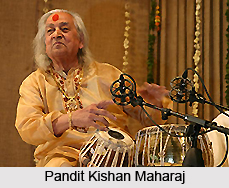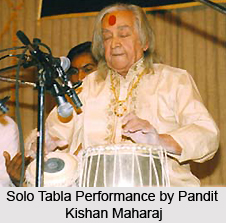 Pandit Kishan Maharaj was a renowned Tabla player of India who had given some of the most cherished and splendid compositions to the country. He belonged to the Benares Gharana of Hindustani classical music. His talent and fame not only shined in the country but also sailed across the world with his magnificent performances. He had also been conferred many awards and recognitions for his invaluable contributions in the field of Indian classical music. His disciples have also earned great prominence in the world of classical music.
Pandit Kishan Maharaj was a renowned Tabla player of India who had given some of the most cherished and splendid compositions to the country. He belonged to the Benares Gharana of Hindustani classical music. His talent and fame not only shined in the country but also sailed across the world with his magnificent performances. He had also been conferred many awards and recognitions for his invaluable contributions in the field of Indian classical music. His disciples have also earned great prominence in the world of classical music.
Early Life of Pandit Kishan Maharaj
Pandit Kishan Maharaj was born on 3rd September 1923 in Kabir Chaura locality of Benaras in Uttar Pradesh. He belonged to a family of professional musicians. His father, Hari Maharaj, trained him initially in the arena of classical music. However following the demise of his father his uncle, Kanthe Maharaj, took over his training. Kanthe Maharaj was a disciple of Baldeo Sahai of the Benares Gharana.
Career of Pandit Kishan Maharaj
Pandit Kishan Maharaj began performing in concerts since the age of eleven. At a very young age he bagged the opportunity of performing with stalwarts of Indian classical music such as Sitara Devi, Girija Devi, Vilayat Khan, Ali Akbar Khan, Ravi Shankar, Bhimsen Joshi, Bade Ghulam Ali Khan, Omkarnath Thakur, Faiyaz Khan and many others. He had special skills of playing cross-rhythms along with complex calculations, especially in tihai patterns.
 His versatility and ability to play with any accompaniment including Dhamar, Dhrupad, Sarod, Sitar, dance and others earned him the title of an excellent accompanist. He had mesmerized his audiences with his solo performances and had also accompanied many celebrated dancers like Birju Maharaj, Natraj Gopi Krishna, Sitara Devi and Shambhu Maharaj. One of his outstanding performances includes `Tala Vadya Kacheri` with the Mridangam Vidwan Palghat Raghu. Pandit Kishan Maharaj toured across the globe extensively being a part of a number of esteemed events including the Edinburgh festival and the Commonwealth Arts festival in the United Kingdom in 1965. He had also performed in the movie Banaras Utsav in the year 2003. He rendered his last performance the Nagari Natak Mandali. Later at the event he suffered a heart attack and was admitted in the ICU.
His versatility and ability to play with any accompaniment including Dhamar, Dhrupad, Sarod, Sitar, dance and others earned him the title of an excellent accompanist. He had mesmerized his audiences with his solo performances and had also accompanied many celebrated dancers like Birju Maharaj, Natraj Gopi Krishna, Sitara Devi and Shambhu Maharaj. One of his outstanding performances includes `Tala Vadya Kacheri` with the Mridangam Vidwan Palghat Raghu. Pandit Kishan Maharaj toured across the globe extensively being a part of a number of esteemed events including the Edinburgh festival and the Commonwealth Arts festival in the United Kingdom in 1965. He had also performed in the movie Banaras Utsav in the year 2003. He rendered his last performance the Nagari Natak Mandali. Later at the event he suffered a heart attack and was admitted in the ICU.
Achievements of Pandit Kishan Maharaj
In the year 1969 he received the title of Sangeet Samrat from the Prayag Sangit Samiti. He also received Sangeet Natak Akademi Award and Hafiz Ali Khan Award in the year 1984 and 1986 respectively. In the years 1973 and 2002, this maestro was honoured with Padma Shri and Padma Vibhushan. In 2002 he was also awarded with the Ustad Inayat Khan Memorial Award.
Personal Life of Pandit Kishan Maharaj
Pandit Kishan Maharaj was married to Savita Devi, who was the daughter of Siddheshwari Devi, the noted Hindustani classical vocalist. The couple has three daughters and a son namely Indira, Purnima, Anjali and Puran Maharaj respectively.
Death of Pandit Kishan Maharaj
Pandit Kishan Maharaj died at the age of 84, on 4th May 2008, at Khajuri near Varanasi.




















